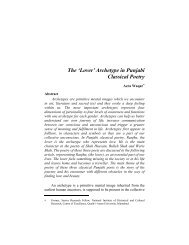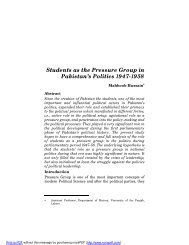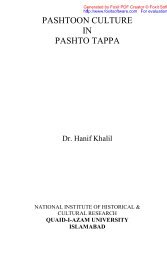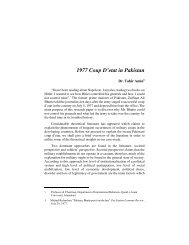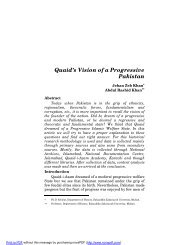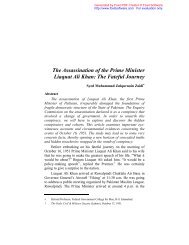The Baloch Resistance Literature Against the British Raj - Nihcr.edu.pk
The Baloch Resistance Literature Against the British Raj - Nihcr.edu.pk
The Baloch Resistance Literature Against the British Raj - Nihcr.edu.pk
Create successful ePaper yourself
Turn your PDF publications into a flip-book with our unique Google optimized e-Paper software.
78 Pakistan Journal of History & Culture, Vol.XXVIII, No.1, 2007<br />
No one will stay behind in this final clash and <strong>the</strong> world will always<br />
remember our daring deeds against <strong>the</strong> <strong>British</strong>. 11<br />
Raham ‘Ali became very popular with <strong>the</strong> tribesmen, particularly<br />
with <strong>the</strong> Marris and young and old both recited his poetry with great<br />
enthusiasm. And it always worked. After all, who else told <strong>the</strong>m that:<br />
“before going out to fight <strong>the</strong> <strong>British</strong>, <strong>the</strong> Marri <strong>Baloch</strong> warrior,<br />
perfumes his beard and drenches his moustaches in scent. With velvet<br />
he covers his body and with flowers he decorates his horse.” 12<br />
Raham ‘Ali strongly condemned those <strong>Baloch</strong> leaders who<br />
accepted money from <strong>the</strong> <strong>British</strong> or supported <strong>the</strong>m out of fear. In his<br />
view, <strong>the</strong>y were traitors not only to <strong>the</strong>ir own glorious tradition of<br />
courage and bravery but also had lost <strong>the</strong>ir faith in Islam. Raham ‘Ali<br />
had nothing but contempt and ridicule for <strong>the</strong>m. He wrote: “Those<br />
people who ran away from <strong>the</strong> difficult times are now safely living in<br />
<strong>the</strong> Karachi area and are enjoying carrot and fish.” 13<br />
Raham ‘Ali stands out as <strong>the</strong> most prominent poet of his time. He<br />
participated in many campaigns against <strong>the</strong> <strong>British</strong>. His poetry<br />
<strong>the</strong>refore, is mainly autobiographical. He says, “Those nations who<br />
like comfort and peace are ultimately destroyed. Self-respect and<br />
honour are considered <strong>the</strong> deeds of real glory for nations.” 14<br />
According to Raham ‘Ali, not only <strong>the</strong> <strong>Baloch</strong> and Afghans but also<br />
o<strong>the</strong>r Muslims have bartered away <strong>the</strong>ir country for a very small price.<br />
Hence, slavery has saturated <strong>the</strong>ir bone marrow like <strong>the</strong> wine gets into<br />
one’s senses. He laid great emphasizes on self-respect, honour and<br />
chivalry throughout his writings. 15 Like most folk poets, though he<br />
was not formally <strong>edu</strong>cated in any school still he had <strong>the</strong> remarkable<br />
ability of conveying his feelings in an inspiring and provocative<br />
language. He wrote more than 50,000 verses against colonialism and<br />
Sardari system. A revolutionary poet as he was, his poetry was<br />
compiled and published by Mir Mitha Khan Marri. Raham ‘Ali’s<br />
popularity, his glorification of <strong>the</strong> Marri culture, his hatred of <strong>the</strong><br />
<strong>British</strong> and disparagement of <strong>the</strong> “loyal’ <strong>Baloch</strong> leaders, ultimately<br />
led to his exile, but soon <strong>the</strong> people demanded his return and a<br />
delegation had to be sent to bring him back, but he was not destined<br />
11. Naseer, <strong>Baloch</strong>i Razmiyyah Shā‘iri, op.cit., p.289.<br />
12. Ibid., p.290.<br />
13. Ibid., p.196.<br />
14. Ibid.<br />
15. Ibid.



